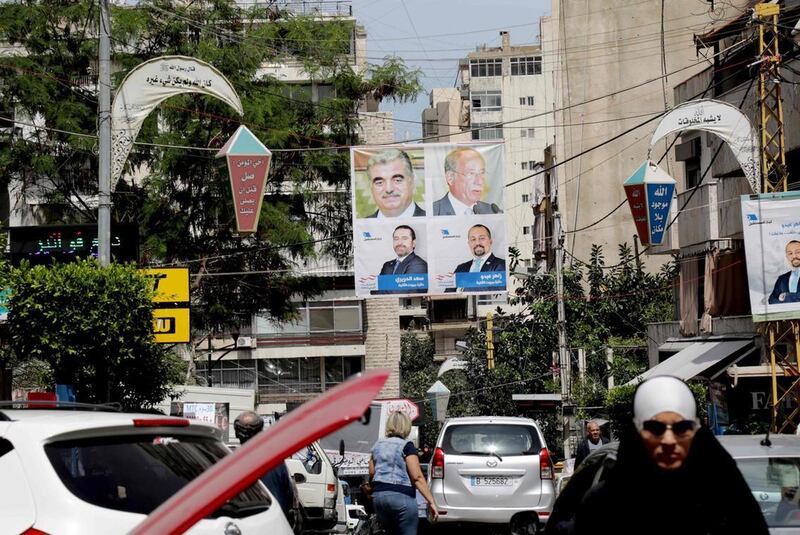Lately, there have been increasing calls from certain quarters in the United States for the Trump administration to target Lebanon because, as proponents of this view put it, the country is controlled by Hezbollah. A common theme is that all of Lebanon merits being treated as a rogue nation since the population is incapable of countering the malign activities of the armed group.
It is indeed true that most Lebanese will not provoke a civil war with Hezbollah to satisfy the party's foes in America or Israel. But it's also worth recalling that the Hezbollah problem has been brewing for a long time. Indeed, Hezbollah took on many of its present characteristics during Lebanon's immediate post-war period in the 1990s, which was defined by a regional consensus blessed by the US.
Lebanon's post-war settlement was the consequence of a broad arrangement that handed the country to Syria, which at the time was preparing to engage in negotiations with Israel over the occupied Golan Heights. The Syrians, seeing the advantages of using Hezbollah in south Lebanon as military leverage over Israel, allowed the party to retain its weapons when all other militias had been disarmed.
During the 1990s, foreign interactions with Lebanon were conducted through Damascus, the final decision-maker on Lebanese matters. For example, in April 1996, when Israel mounted its Grapes of Wrath operation against Hezbollah, the US secretary of state, Warren Christopher, worked out an accord in Syria’s capital to end the fighting that effectively included Hezbollah, Syria and Israel.
The late journalist Samir Kassir had written an article in which he bitterly observed that the Syrian president at the time, Hafez Al Assad, had negotiated with the Americans and Israelis over the blood of the Lebanese. Indeed he had, but he was not alone. Mr Christopher's agreement, the so-called April Understanding, set rules of the game for fighting between Israel and Hezbollah, mainly to protect civilians. While the Lebanese government was a party to the agreement, it had little say in the matter and was, in reality, a cover for Hezbollah.
___________________________
Read more from Opinion:
[ Rashmee Roshan Lall: Could capricious American unilateralism leave the US out in the cold? ]
___________________________
In other words, this major achievement for Hezbollah was an agreement mediated in Damascus by the United States, one of whose parties was Israel. For years, Israel would respect the understanding, as would Hezbollah, whose legitimacy was greatly enhanced in the process.
After that, Hezbollah would seek to replicate the understanding in its dealings with the Israelis. It wouldn't succeed formally but after Israel's pull-out from Lebanon in May 2000, a de facto understanding was reached. The party would continue to attack Israeli forces in the Shebaa Farms area with only localised responses from the other side, although the United Nations did not recognise this area as occupied Lebanon. This implicit arrangement would last until 2006.
For a long time, Syria's use of Hezbollah to pressure Israel was accepted by the Israelis and Americans because they regarded it as an acceptable facet of peace talks. Assad was viewed as a cunning leader trying to shape the outcome of negotiations in his favour and it was assumed that once these were concluded, he would bring Hezbollah to heel. But no peace deal was signed and the party took on an increasingly central role after the Syrian withdrawal from Lebanon in 2005, as Damascus and Tehran used it to maintain their influence in the country.
Does this mean that the United States or Israel was instrumental in Hezbollah's rise? Not quite but at key moments, both countries preferred to deal pragmatically with the reality of the party, which only reinforced Hezbollah at the expense of the Lebanese state. Moreover, Syria paid no penalty whatsoever for allowing the party to accumulate strength, largely because the Israelis and Americans always regarded the Al Assad family as a stabilising force in Lebanon and the region.
That is why the sudden discovery today that Hezbollah poses a major regional threat, coupled with calls to make Lebanon pay a price for this, is alarming in its potential impact. Lebanon already paid a heavy price for Hezbollah when most regional powers, as well as the US, helped perpetuate a post-war order that sanctioned Syrian hegemony over the country and allowed the party to thrive. Back in those days, it was called “integrating Hezbollah into the state”, until it became evident the party saw the state as a way of protecting its independence.
Recognition of this reality is necessary whenever the foolish idea of destroying Lebanon to obliterate Hezbollah comes up. Making Lebanon suffer for the past errors of outside countries that gave leeway to the party and its sponsors, not least the US and Israel, would bring disaster. Hezbollah might be a menace but throwing the Lebanese baby out with the bathwater is no way to resolve it.
Michael Young is editor of Diwan, the blog of the Carnegie Middle East programme, in Beirut





